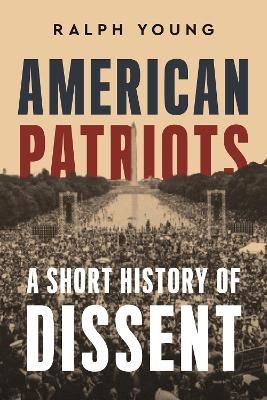
American Patriots
A Short History of Dissent
Seiten
2024
New York University Press (Verlag)
978-1-4798-2652-0 (ISBN)
New York University Press (Verlag)
978-1-4798-2652-0 (ISBN)
A concise history that proves that dissent is patriotic
The history of America is a history of dissent. Protests against the British Parliament’s taxation policies led to the American Revolution and the creation of the United States. At the Constitutional Convention the founders put the right to protest in the First Amendment of the Bill of Rights. In the nineteenth century, dissenters protested against the War of 1812 and the Mexican War, they demanded the abolition of slavery, suffrage for women, and fair treatment for workers. In the twentieth century, millions of Americans participated in the Civil Rights Movement, the antiwar movement, and second-wave feminism. In the twenty-first century, hundreds of thousands protested the war in Iraq, joined the 2011 Occupy movement, the 2017 Women’s March, and the 2020 Black Lives Matter uprisings. The crowds grew larger than ever, but the sentiments expressed were familiar. There have been dissenting Americans for as long as there has been an America.
In American Patriots, historian Ralph Young chronicles the key role dissent has played in shaping the United States. He explains that activists are not protesting against America, but pushing the country to live up to its ideals. As he guides the reader through the history of protest, Young considers how ordinary Americans, from moderates to firebrands, responded to injustice. He highlights the work of organizations like SNCC and ACT UP, and he follows iconic individuals like Ida B. Wells-Barnett and Woody Guthrie, charting the impact of their dissent. Some of these protesters are celebrated heroes of American history, while others are ordinary people, frequently overlooked, whose stories show that change is often accomplished through grassroots activism.
Yet not all dissent is equal. In 2021, thousands of rioters stormed the US Capitol, and Americans on both sides of the aisle watched the destruction with horror. American Patriots contrasts this attack with the long history of American protest, and challenges us to explore our definition of dissent. Does it express a legitimate grievance or a smokescreen for undermining democracy? What are the limits of dissent? Where does dissent end and sedition begin?
In a time when legitimate dissent is framed as unpatriotic, Young reminds us of the dissenters who have shaped our country’s history. American Patriots is a necessary defense of our right to demand better for ourselves, our communities, and our nation.
The history of America is a history of dissent. Protests against the British Parliament’s taxation policies led to the American Revolution and the creation of the United States. At the Constitutional Convention the founders put the right to protest in the First Amendment of the Bill of Rights. In the nineteenth century, dissenters protested against the War of 1812 and the Mexican War, they demanded the abolition of slavery, suffrage for women, and fair treatment for workers. In the twentieth century, millions of Americans participated in the Civil Rights Movement, the antiwar movement, and second-wave feminism. In the twenty-first century, hundreds of thousands protested the war in Iraq, joined the 2011 Occupy movement, the 2017 Women’s March, and the 2020 Black Lives Matter uprisings. The crowds grew larger than ever, but the sentiments expressed were familiar. There have been dissenting Americans for as long as there has been an America.
In American Patriots, historian Ralph Young chronicles the key role dissent has played in shaping the United States. He explains that activists are not protesting against America, but pushing the country to live up to its ideals. As he guides the reader through the history of protest, Young considers how ordinary Americans, from moderates to firebrands, responded to injustice. He highlights the work of organizations like SNCC and ACT UP, and he follows iconic individuals like Ida B. Wells-Barnett and Woody Guthrie, charting the impact of their dissent. Some of these protesters are celebrated heroes of American history, while others are ordinary people, frequently overlooked, whose stories show that change is often accomplished through grassroots activism.
Yet not all dissent is equal. In 2021, thousands of rioters stormed the US Capitol, and Americans on both sides of the aisle watched the destruction with horror. American Patriots contrasts this attack with the long history of American protest, and challenges us to explore our definition of dissent. Does it express a legitimate grievance or a smokescreen for undermining democracy? What are the limits of dissent? Where does dissent end and sedition begin?
In a time when legitimate dissent is framed as unpatriotic, Young reminds us of the dissenters who have shaped our country’s history. American Patriots is a necessary defense of our right to demand better for ourselves, our communities, and our nation.
Ralph Young is Professor of Instruction in History at Temple University. He is the author of Make Art Not War: Political Protest Posters from the Twentieth Century and Dissent in America: The Voices That Shaped a Nation.
| Erscheinungsdatum | 12.12.2023 |
|---|---|
| Zusatzinfo | 22 b/w illustrations |
| Verlagsort | New York |
| Sprache | englisch |
| Maße | 152 x 229 mm |
| Gewicht | 694 g |
| Themenwelt | Geisteswissenschaften ► Geschichte ► Regional- / Ländergeschichte |
| Sozialwissenschaften ► Politik / Verwaltung ► Politische Systeme | |
| Sozialwissenschaften ► Politik / Verwaltung ► Politische Theorie | |
| ISBN-10 | 1-4798-2652-9 / 1479826529 |
| ISBN-13 | 978-1-4798-2652-0 / 9781479826520 |
| Zustand | Neuware |
| Haben Sie eine Frage zum Produkt? |
Mehr entdecken
aus dem Bereich
aus dem Bereich
Erinnerungen
Buch | Softcover (2024)
Pantheon (Verlag)
16,00 €
Universalgelehrter, Polarreisender, Entdecker
Buch | Hardcover (2024)
mareverlag
28,00 €


